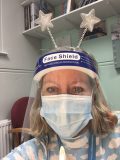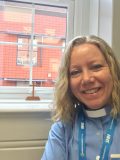CA Healthcare Chaplains
Meet Louise Yaull
Medical treatment can be a scary and lonely experience, especially for those in hospitals or hospices who are separated from loved ones. Healthcare staff are often focused on practical treatment and may not have the time or expertise to address a patient’s emotional, spiritual or religious needs. This is where healthcare chaplains come in. They offer comfort, support and a listening ear to patients, families and staff during difficult times, including bereavement and trauma. Many compassionate Church Army Evangelists become healthcare chaplains to provide invaluable care to those who need it most. Louise Yaull is Chaplaincy Team Leader at the Northern General Hospital in Sheffield and the Deputy Head of Chaplaincy. She is also an ordained minister and Commissioned Church Army Evangelist.
Meet Louise Yaull
I have worked in the NHS since I was 19, and I did some evangelism studies with Church Army while I was nursing. As a nurse, I was and still am a practical, hands-on person, and I like the hands-on mission of CA to reach the last and the lost. I felt drawn to the ethos of not just ministering in the church but of getting out there and meeting people where they are. I was accepted onto training, and I became a Commissioned Evangelist in 2007. I pioneered GP chaplaincy with CA support for about five years, becoming Lead Evangelist at the Wilson Carlile Centre, Sheffield. I then felt it was time for a change, and I took on a chaplaincy role in a hospital. With my NHS background, the right place for me is with sick and hurting people. Day-to-day chaplaincy is what I love.
Hospitals are secular environments, which brings challenges as a Christian chaplain. I have to maintain professional boundaries, and I cannot be seen to impose my faith on anyone. However, over the years, I have learnt that you can share your faith in a very natural way if a patient welcomes it. There is increasing pressure on chaplains to be generic so that we can relate to people of all faiths and beliefs. In reality, I am not sure that we can do this, as we all come with our own belief systems, be that Christian or Muslim or Humanist. We can offer inclusive pastoral care, but the importance of distinctiveness in offering religious rituals and prayer can be important at times of crisis for patients, such as at the end of life.
The greatest joys for me are doing things like weddings and baptisms, although there is a lot of sadness, too, as they often involve someone who is terminally ill. This can make them very different to events in a parish setting, where hopefully all parties will live to a ripe old age, but the families I deal with are hugely grateful. When I am in a secular environment like a hospital, I realise leading a religious ceremony is precious. When I am doing a baptism in a special care baby unit, I suddenly find this very medical environment becomes a very holy space, and that feels very special.


Prayer InFocus
- Pray that chaplains will bring hope, comfort and a compassionate, listening presence as they support patients, visitors and staff in times of need.
- Pray that chaplains will work well with colleagues of all faiths and beliefs in the often stressful NHS context.
- Pray that chaplains will experience God’s love, joy, strength and guidance as they follow their calling to work as hospital chaplains.
